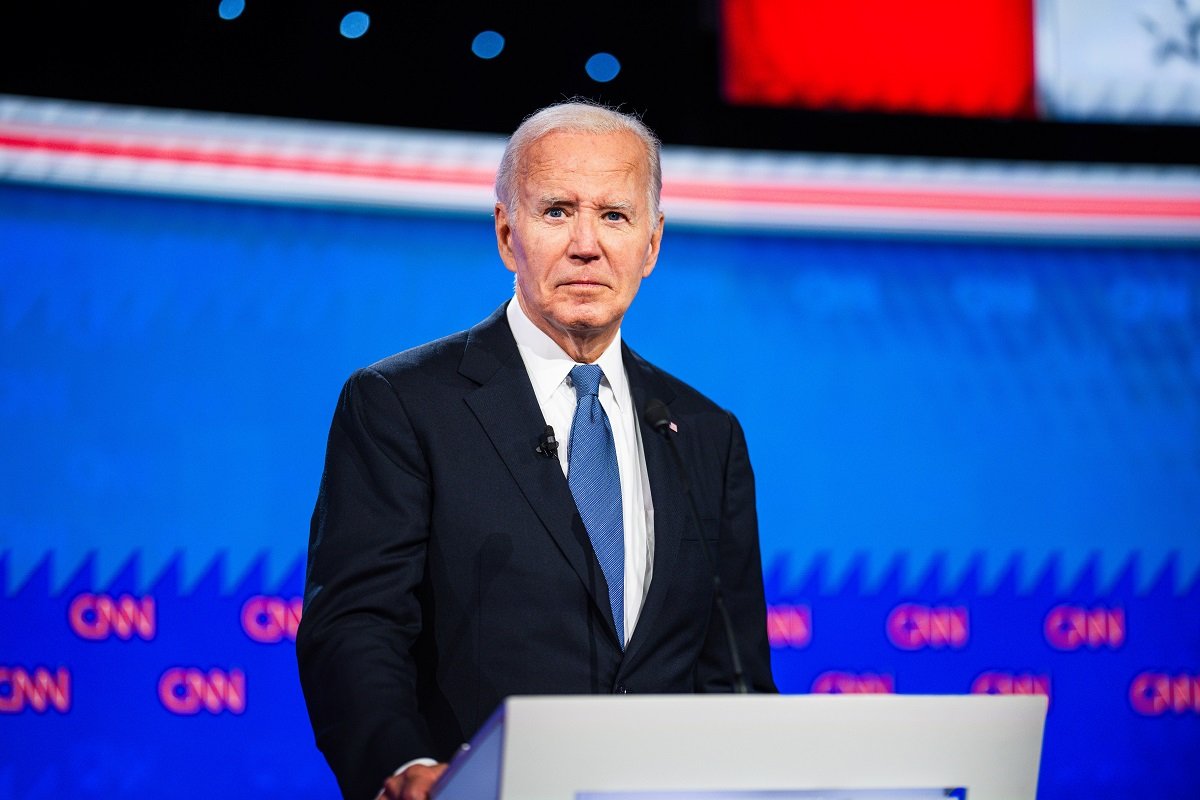
President Biden at the presidential debate in Atlanta on Thursday.
17:13 JST, June 30, 2024
With Democrats in a full panic over President Biden’s disastrous debate performance, the public calls and private hopes are mounting for him to step aside.
But then what?
The hard truth for Democrats is that attempting to replace Biden at the convention in August could be even more perilous than sticking with the lame horse they are riding.
The president and his advisers are adamant that he plans to stay in the race. And indeed, it was a far more robust candidate who appeared at a rally on Friday in Raleigh, N.C. “I’m here in North Carolina for one reason: Because I intend to win this state in November. We win here, we win the election,” he declared to a packed and cheering crowd.
Privately, top officials of his campaign embarked on a mission to assure shaken donors that, while the president’s onstage performance was lacking, he remains capable of beating Donald Trump.
If Biden were to step aside, Vice President Harris would likely declare her candidacy quickly. But given her unpopularity, others would surely make themselves available as well. Most likely, they would come from Democrats’ talented and attractive crop of governors: California’s Gavin Newsom, Michigan’s Gretchen Whitmer, Illinois’ J.B. Pritzker, Pennsylvania’s Josh Shapiro, North Carolina’s Roy Cooper, to name a few.
Under this scenario, the 3,894 convention delegates previously bound to Biden – well more than the 1,968 needed for the nomination – would become free agents. They come from a broad universe of activists, union leaders and local party stalwarts from factions across the party. They aren’t under the thumb of a few party leaders.
The convention will be held Aug. 19 to 22, but the Democratic National Committee is already planning a “virtual roll call” by Aug. 7, a move that is necessary to assure that his name is certified to be on the Ohio ballot this fall.
As I have written before, Democratic Party rules make it technically possible to reopen the nominating process at the convention. And people are certain to point to history for the last example of a late scramble: At the end of March in 1968, President Lyndon B. Johnson acceded to the reality that his chances of reelection were hopeless and announced he would not seek or accept his party’s nomination.
But back in those days, things worked very differently. Only 14 states and the District of Columbia held primaries. In most of the country, party bosses – mayors, governors, ward leaders, local chairs and the like – called the shots.
They regrouped around Vice President Hubert Humphrey, who got the Democratic nomination without competing seriously in a single primary. And then came the trauma and violence of that year’s convention in Chicago.
Humphrey went down to defeat in November, which is why the modern system of state-by-state primaries and caucuses was put into place. The Republicans also retooled their processes. Conventions became a formality. Not since the epic 1976 GOP primary battle between Gerald Ford and Ronald Reagan has the nomination not been settled in advance.
But what if, this year, it’s not? Senior figures such as former presidents Barack Obama and Bill Clinton might have some influence over the party’s choice, but the proverbial smoke-filled rooms are long gone.
Further dismantling the old power structure are new forces of social media and big money.
Is it really possible to expect a consensus candidate to emerge from the chaos? And even if one should, would that man or woman, untested by the rigors of a national primary, really be in any shape to carry the Democratic standard over the finish line in November?
Biden might have gone down as the most successful one-term president in modern history, maybe ever. His legacy might have been secure as the man who saved the country from Trump. Instead, he chose to put the nation through this in an election year when not only the White House but control of the House and Senate are on a razor’s edge.
The party also made its choice. It closed its eyes to Biden’s increasingly obvious mental and physical deficiencies. But America knows what it saw on Thursday night. Now the only real option that is left for Democrats is wishing for a miracle.
Top Articles in News Services
-

Survey Shows False Election Info Perceived as True
-

Hong Kong Ex-Publisher Jimmy Lai’s Sentence Raises International Outcry as China Defends It
-

Japan’s Nikkei Stock Average Touches 58,000 as Yen, Jgbs Rally on Election Fallout (UPDATE 1)
-

Japan’s Nikkei Stock Average Falls as US-Iran Tensions Unsettle Investors (UPDATE 1)
-

Trump Names Former Federal Reserve Governor Warsh as the Next Fed Chair, Replacing Powell
JN ACCESS RANKING
-

Producer Behind Pop Group XG Arrested for Cocaine Possession
-

Japan PM Takaichi’s Cabinet Resigns en Masse
-

Man Infected with Measles Reportedly Dined at Restaurant in Tokyo Station
-

Israeli Ambassador to Japan Speaks about Japan’s Role in the Reconstruction of Gaza
-

Videos Plagiarized, Reposted with False Subtitles Claiming ‘Ryukyu Belongs to China’; Anti-China False Information Also Posted in Japan





















